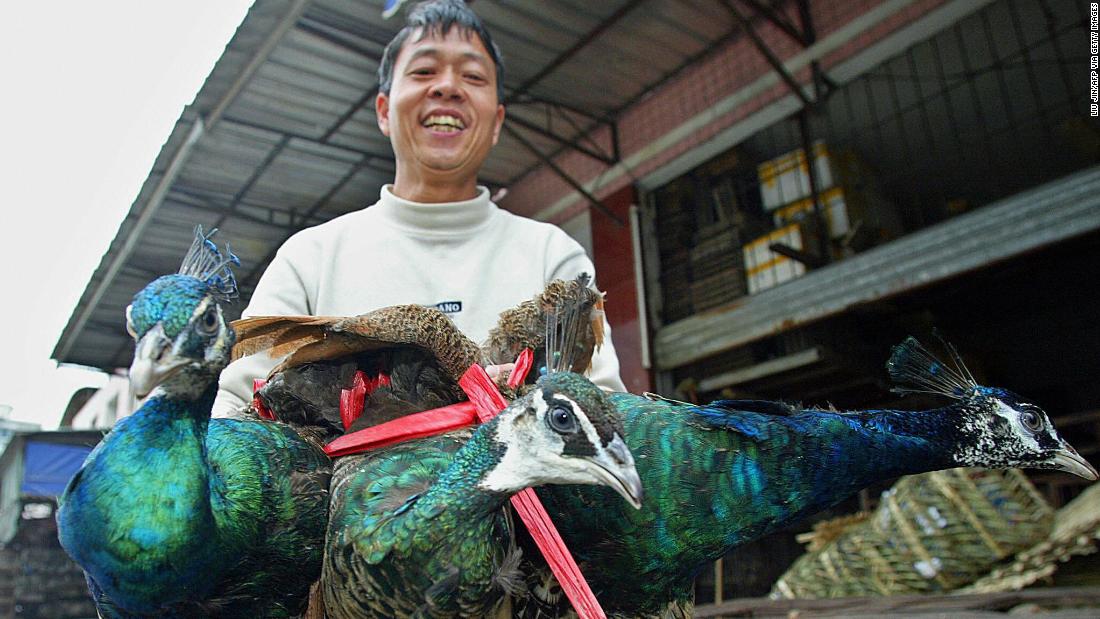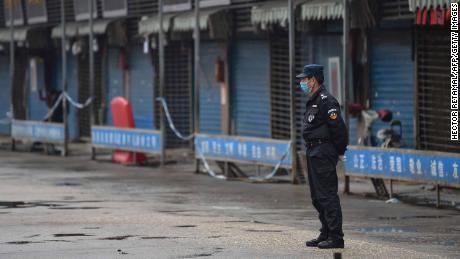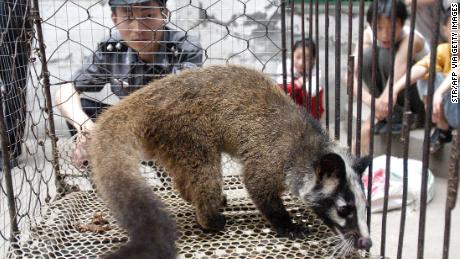You are using an out of date browser. It may not display this or other websites correctly.
You should upgrade or use an alternative browser.
You should upgrade or use an alternative browser.
The official COVID-19/Coronavirus Discussion Thread...aka I hope I don't get the Rona
- Thread starter Goldie
- Start date
More options
Who Replied?DOS_patos
Unverified Legion of Trill member
He don't no one touching him...Lol
No tie an looking disheveled
DMorgan
You niggas is EXCOMMUNICADO!!!
StringerBell
OG
StringerBell
OG
StringerBell
OG

The Trump Coronavirus Team Keeps Falsely Blaming Obama For Testing Disaster
At a White House Coronavirus Task Force meeting Wednesday, President Donald Trump presented a bold — and completely false — attempt to blame former President Barack Obama for the current lack of…
talkingpointsmemo.com

StringerBell
OG

Larry Kudlow Is Still Out There Spewing Happy Talk About COVID-19
Larry Kudlow put on an incredible display of scientific ignorance Friday, asserting on cable news that COVID-19 was "contained" and that Americans should go on with their lives.
talkingpointsmemo.com
StringerBell
OG
StringerBell
OG

Coronavirus Hits University of Washington, College Cancels All In-Person Classes
The University of Washington is set to no longer hold classes after the novel coronavirus hit the Seattle campus with one staff member being deeded “presumptive positive” the institution announced Friday - as the city braces with the spike of COVID-19 cases being detected. The staff member at...
StringerBell
OG
DOS_patos
Unverified Legion of Trill member
Hate to be that guy..But he's kinda right.
i work in this field..... Hes not too far off.
12bitCounsel
Je Ne Sais Quoi
SXSW - cancelled
StringerBell
OG
TheNightKing
J.A.P.A.N.
That’s what I was thinking. From everything I’ve heard, it’s only killing the same populations of people the normal flu kills. Many people getting over it just fine.Hate to be that guy..But he's kinda right.
i work in this field..... Hes not too far off.
I do feel for those people getting killed cause it is a human life, but the reality is the reality.
Mr.LV
OG
China has made eating wild animals illegal after the coronavirus outbreak. But ending the trade won't be easy
By Ben Westcott and Shawn Deng, CNN
Updated 11:47 PM ET, Thu March 5, 2020

 www.cnn.com
www.cnn.com
Hong Kong (CNN)A strict ban on the consumption and farming of wild animals is being rolled out across China in the wake of the deadly coronavirus epidemic, which is believed to have started at a wildlife market in Wuhan.
Although it is unclear which animal transferred the virus to humans -- bat, snake and pangolin have all been suggested -- China has acknowledged it needs to bring its lucrative wildlife industry under control if it is to prevent another outbreak.
In late February, it slapped a temporary ban on all farming and consumption of "terrestrial wildlife of important ecological, scientific and social value," which is expected to be signed into law later this year.
But ending the trade will be hard. The cultural roots of China's use of wild animals run deep, not just for food but also for traditional medicine, clothing, ornaments and even pets.
This isn't the first time Chinese officials have tried to contain the trade. In 2003, civets -- mongoose-type creatures -- were banned and culled in large numbers after it was discovered they likely transferred the SARS virus to humans. The selling of snakes was also briefly banned in Guangzhou after the SARS outbreak.
But today dishes using the animals are still eaten in parts of China.
Public health experts say the ban is an important first step, but are calling on Beijing to seize this crucial opportunity to close loopholes -- such as the use of wild animals in traditional Chinese medicine -- and begin to change cultural attitudes in China around consuming wildlife.

A security guard stands outside the Huanan Seafood Wholesale Market where the coronavirus was detected in Wuhan on January 24.
Markets with exotic animals
The Wuhan seafood market at the center of the novel coronavirus outbreak was selling a lot more than fish.
Snakes, raccoon dogs, porcupines and deer were just some of the species crammed inside cages, side by side with shoppers and store owners, according to footage obtained by CNN.Some animals were filmed being slaughtered in the market in front of customers. CNN hasn't been able to independently verify the footage, which was posted to Weibo by a concerned citizen, and has since been deleted by government censors.
It is somewhere in this mass of wildlife that scientists believe the novel coronavirus likely first spread to humans. The disease has now infected more than 94,000 people and killed more than 3,200 around the world.
The Wuhan market was not unusual. Across mainland China, hundreds of similar markets offer a wide range of exotic animals for a range of purposes.
The danger of an outbreak comes when many exotic animals from different environments are kept in close proximity.
"These animals have their own viruses," said Hong Kong University virologist professor Leo Poon. "These viruses can jump from one species to another species, then that species may become an amplifier, which increases the amount of virus in the wet market substantially."
When a large number of people visit markets selling these animals each day, Poon said the risk of the virus jumping to humans rises sharply.
Poon was one of the first scientists to decode the SARS coronavirus during the epidemic in 2003. It was linked to civet cats kept for food in a Guangzhou market, but Poon said researchers still wonder whether SARS was transmitted to the cats from another species.
"(Farmed civet cats) didn't have the virus, suggesting they acquired it in the markets from another animal," he said.

Picture taken in May 2003 shows a policeman watching over a civet cat captured in the wild by a farmer in Wuhan, central China's Hubei province.
Strength and status
Annie Huang, a 24-year-old college student from southern Guangxi province, said she and her family regularly visit restaurants that serve wild animals.
She said eating wildlife, such as boar and peacock, is considered good for your health, because diners also absorb the animals' physical strength and resilience.
Exotic animals can also be an important status symbol. "Wild animals are expensive. If you treat somebody with wild animals, it will be considered that you're paying tribute," she said. A single peacock can cost as much as 800 yuan ($144).
Huang asked to use a pseudonym when speaking about the newly-illegal trade because of her views on eating wild animals.
She said she doubted the ban would be effective in the long run. "The trade might lay low for a few months ... but after a while, probably in a few months, people would very possibly come back again," she said
Beijing hasn't released a full list of the wild animals included in the ban, but the current Wildlife Protection Law gives some clues as to what could be banned. That law classifies wolves, civet cats and partridges as wildlife, and states that authorities "should take measures" to protect them, with little information on specific restrictions.
The new ban makes exemptions for "livestock," and in the wake of the ruling animals including pigeons and rabbits are being reclassified as livestock to allow their trade to continue.
By Ben Westcott and Shawn Deng, CNN
Updated 11:47 PM ET, Thu March 5, 2020

China has banned eating wild animals after the coronavirus outbreak. Ending the trade will be hard
A strict ban on the consumption and farming of wild animals is being rolled out across China in the wake of the deadly coronavirus epidemic, which is believed to have started at a wildlife market in Wuhan.
Hong Kong (CNN)A strict ban on the consumption and farming of wild animals is being rolled out across China in the wake of the deadly coronavirus epidemic, which is believed to have started at a wildlife market in Wuhan.
Although it is unclear which animal transferred the virus to humans -- bat, snake and pangolin have all been suggested -- China has acknowledged it needs to bring its lucrative wildlife industry under control if it is to prevent another outbreak.
In late February, it slapped a temporary ban on all farming and consumption of "terrestrial wildlife of important ecological, scientific and social value," which is expected to be signed into law later this year.
But ending the trade will be hard. The cultural roots of China's use of wild animals run deep, not just for food but also for traditional medicine, clothing, ornaments and even pets.
This isn't the first time Chinese officials have tried to contain the trade. In 2003, civets -- mongoose-type creatures -- were banned and culled in large numbers after it was discovered they likely transferred the SARS virus to humans. The selling of snakes was also briefly banned in Guangzhou after the SARS outbreak.
But today dishes using the animals are still eaten in parts of China.
Public health experts say the ban is an important first step, but are calling on Beijing to seize this crucial opportunity to close loopholes -- such as the use of wild animals in traditional Chinese medicine -- and begin to change cultural attitudes in China around consuming wildlife.

A security guard stands outside the Huanan Seafood Wholesale Market where the coronavirus was detected in Wuhan on January 24.
Markets with exotic animals
The Wuhan seafood market at the center of the novel coronavirus outbreak was selling a lot more than fish.
Snakes, raccoon dogs, porcupines and deer were just some of the species crammed inside cages, side by side with shoppers and store owners, according to footage obtained by CNN.Some animals were filmed being slaughtered in the market in front of customers. CNN hasn't been able to independently verify the footage, which was posted to Weibo by a concerned citizen, and has since been deleted by government censors.
It is somewhere in this mass of wildlife that scientists believe the novel coronavirus likely first spread to humans. The disease has now infected more than 94,000 people and killed more than 3,200 around the world.
The Wuhan market was not unusual. Across mainland China, hundreds of similar markets offer a wide range of exotic animals for a range of purposes.
The danger of an outbreak comes when many exotic animals from different environments are kept in close proximity.
"These animals have their own viruses," said Hong Kong University virologist professor Leo Poon. "These viruses can jump from one species to another species, then that species may become an amplifier, which increases the amount of virus in the wet market substantially."
When a large number of people visit markets selling these animals each day, Poon said the risk of the virus jumping to humans rises sharply.
Poon was one of the first scientists to decode the SARS coronavirus during the epidemic in 2003. It was linked to civet cats kept for food in a Guangzhou market, but Poon said researchers still wonder whether SARS was transmitted to the cats from another species.
"(Farmed civet cats) didn't have the virus, suggesting they acquired it in the markets from another animal," he said.

Picture taken in May 2003 shows a policeman watching over a civet cat captured in the wild by a farmer in Wuhan, central China's Hubei province.
Strength and status
Annie Huang, a 24-year-old college student from southern Guangxi province, said she and her family regularly visit restaurants that serve wild animals.
She said eating wildlife, such as boar and peacock, is considered good for your health, because diners also absorb the animals' physical strength and resilience.
Exotic animals can also be an important status symbol. "Wild animals are expensive. If you treat somebody with wild animals, it will be considered that you're paying tribute," she said. A single peacock can cost as much as 800 yuan ($144).
Huang asked to use a pseudonym when speaking about the newly-illegal trade because of her views on eating wild animals.
She said she doubted the ban would be effective in the long run. "The trade might lay low for a few months ... but after a while, probably in a few months, people would very possibly come back again," she said
Beijing hasn't released a full list of the wild animals included in the ban, but the current Wildlife Protection Law gives some clues as to what could be banned. That law classifies wolves, civet cats and partridges as wildlife, and states that authorities "should take measures" to protect them, with little information on specific restrictions.
The new ban makes exemptions for "livestock," and in the wake of the ruling animals including pigeons and rabbits are being reclassified as livestock to allow their trade to continue.
